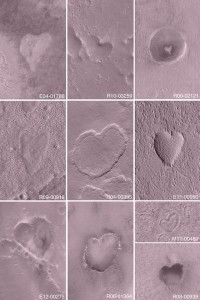St.Valentine’s Day ‘Love Formula’

According to the series of photos on your left, love is alive and well on the planet Mars. Good to know as we contemplate increasing love on the planet Earth. What better day to reveal the ‘secret formula of love’ than on St. Valentine’s Day?
This particular formula has been right under our noses for centuries. Unfortunately, it has gotten overlooked and neglected except by a small number of determined individuals with their hearts set on understanding what love really is.
By the way, for an interesting earthy look into this problem of defining love, you might start with Karen Porter Sorensen’s ‘love research’ described in detail in her book entitled, love (luv)n. (2010). For her, the ‘streets’ were the best source of information on love available.
The ‘love formula’ I’m offering has a lot to do with growing love. Love grows in two distinct ways: in depth and in width. So our formula is the amount of love in your life = depth of your love x width of your love. Let’s take this formula apart so that we can understand its different parts and practical applications.
The ‘amount of love in your life’ is the value we are trying to increase. Obviously, the higher that value the more love you have in your life. For most people, more love is better than less love. Unfortunately, most people don’t think in terms of increasing the amount of love in their lives.
I think we easily become complacent and satisfied with less love than we could have with a little directed understanding and effort. Perhaps part of the problem is, this sort of thing has never been made practical enough to think of it as something that can be ‘built.’ Until now.
Now let’s consider the ‘depth of your love.’ Thinking in terms of ‘depth of love’ gets a little murky unless we first introduce a fact that will help us define what I am trying to describe. The fact is your ‘uniqueness’ as a person.
If you have any doubts as to your individual uniqueness, consider the evidence. No one on the face of the earth has ever or will ever totally replicate the particulars of your individual life and experience. Ever. Of course we could add a little physical evidence and mention that your fingerprints are undeniably distinct and never to be replicated.
By now I should have convinced you of your uniqueness. For most of us, this is an easily ignored fact of a human being’s life. So easily, it’s hardy ever mentioned. In fact we are mostly concerned and preoccupied with how ‘similar’ or ‘different’ we are from each other.
The reason I’m making a big deal out of your uniqueness is simply because, that’s precisely where the deepening of your love would occur. If you understand and value your unique individuality, you can understand and value other people’s unique individualities. It’s impossible to do this without feeling love for yourself and others.
Put it like this, if you want to deepen your ability to love, recognize your uniqueness as a person. You can already see how easily this generalizes to other people as well. The ‘width of your love’ is the extent to which you recognize that uniqueness in others.
I have to caution you at this point, once you start experimenting with recognizing the uniqueness of yourself and others, your perception of people changes. Our definition of uniqueness naturally includes an understanding of how precious each person really is. The standard of value is always related to the extent to which something of value can be replicated.
Uniqueness implies ‘one of a kind,’ never to be replicated. Once you recognize the uniqueness of very single individual you encounter, the feeling may be overwhelming at first. The hard part is realizing that so much of our preciousness is squandered and mistreated.
If you’ve allowed yourself to be influenced by these realizations, the project to increase the amount of love in your life will generalize beyond St. Valentine’s Day. Along with getting to know and value your own uniqueness as a person, you’ll start consciously loving as many unique persons as you can.
Comments? Welcome. Dr. Tom Jordan
